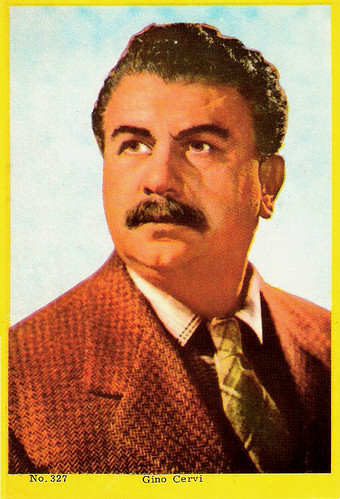
Mexican Collectors card, no. 327.
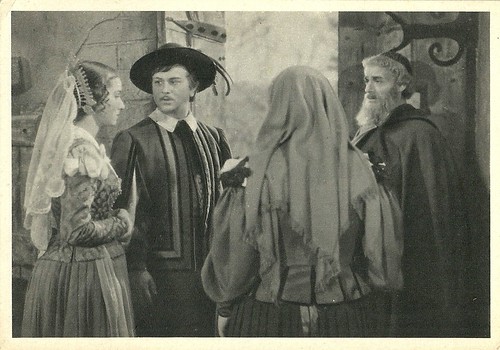
Italian postcard by S.A. Grafitalia, Milano (Milan), no. 4. Photo: Film Lux. Publicity still for I Promessi Sposi/The Spirit and the Flesh (Mario Camerini, 1941). Left to right Dina Sassoli as Lucia, Gino Cervi as Renzo, on the back Gilda Marchiò as Agnese, and Luis Hurtado as Padre Cristoforo.
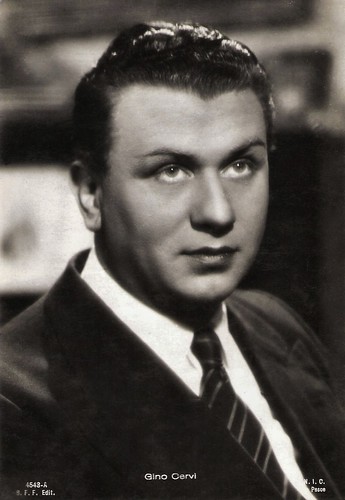
Italian postcard by B.F.F. Edit, no. 4648-A. Photo: Pesce / N.I.C.
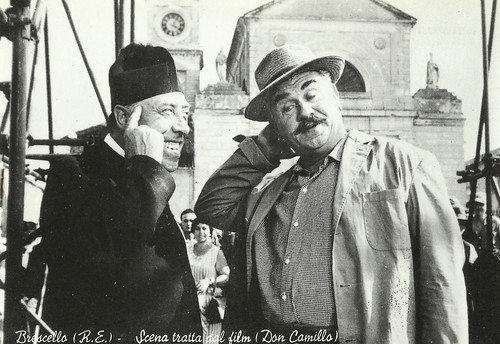
Italian postcard by Ed. Riservata Chiesa Parocchiale di Brescello. Promotion card for the village of Brescello (Reggio Emilia), where the Don Camillo films were shot. Fernandel is the catholic priest Don Camillo and Gino Cervi is the communist mayor Peppone.
A cherished all-round actor
Gino Cervi was born Luigi Cervi in Bologna, Italy in 1901. He was the son of literary critic Antonio Cervi. Gino was stage-struck from an early age. In 1924 he debuted on stage with Alda Borelli in 'La vergine folle', a play by Henry Bataille, directed by Henri Diamant-Berger. In 1928 he married Angela Rosa (Nini) Gordini, one of his colleagues, and they had a son, Antonio, the later director and producer Tonino Cervi.
Gino Cervi became more and more popular and became the first actor at the Tofano-Maltagliati company (1935-1937). His deep and suggestive voice and his extreme versatility made him a cherished all-round actor, famous for his Othello. In 1938 he raised his own theatre company, with Andreina Pagnani, Rina Morelli, and Paolo Stoppa, connected with the Teatro Eliseo in Rome. In 1939 he became director of this theatre. His portrayals of Feste in 'Twelfth Night' (1938) and Falstaff in 'The Merry Wives of Windsor' (1939) established him as the foremost Italian comedian in classic roles.
In the early 1930s, Cervi made his screen debut in a film on the Air Force. Immediately demonstrating his versatility, he appeared in Mario Camerini's melancholic love story T'amerò sempre/I Will Always Love You (1933). But it was in the late 1930s that he came to the foreground as a film actor thanks to director Alessandro Blasetti, who had him perform in such historical epics as Ettore Fieramosca (Alessandro Blasetti, 1938), Un’avventura di Salvator Rosa/An Adventure of Salvator Rosa (Alessandro Blasetti, 1939) and La corona di ferro/The Iron Crown (Alessandro Blasetti, 1941) with Massimo Girotti as his son.
Blasetti recognized Cervi's range and cast him in the role of the plain, downtrodden travelling salesman in his neorealist precursor Quattro passi fra le nuvole/A Walk in the Clouds (Alessandro Blasetti, 1942). Cervi pretends to be the husband of a pregnant, unmarried girl (Adriana Benetti), just to help her out. It was the first of his films to be shown widely outside Italy.
Elaine Mancini at Film Reference: "His performance in one scene of a little-known film, La Peccatrice/The Sinner (Amleto Palermi, 1940), is a tour de force that represents Cervi's combination of technical virtuosity and naturalness. He plays a cad living in a small town; a person he has victimized, the 'sinner' of the title, has returned to the town after several years and watches him eating alone in a restaurant. In this scene, he must express the cad's entire character — his disregard for others, his lack of conscience, his pomposity — simply by eating his meal." For decades, Cervi was also the Italian voice for various American actors, such as Laurence Olivier and Orson Welles in their Shakespearian films, Clark Gable in It Happened One Night (Frank Capra, 1934), James Mason in Pandora (Albert Lewin, 1950), James Stewart in Harvey (Henry Koster, 1950) and Michael Redgrave in Morning Becomes Electra (Dudley Nichols, 1947).

Italian postcard by B.F.F. Edit., no. 3893. Photo: Bragaglia.
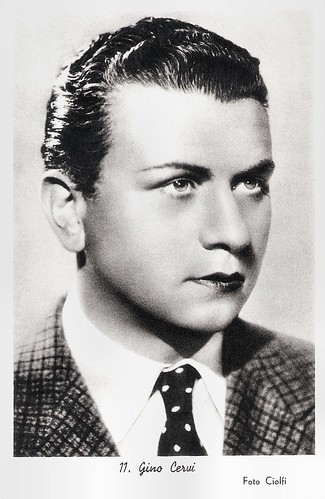
Italian postcard, no. 11. Photo: Ciolfi.
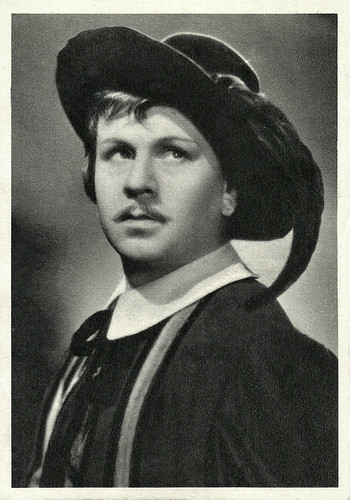
Italian postcard by S.A. Grafitalia, Milano (Milan), no. 10. Photo: Film Lux. Publicity still for I Promessi Sposi/The Spirit and the Flesh (Mario Camerini, 1941) with Gino Cervi as Renzo Tramaglino.
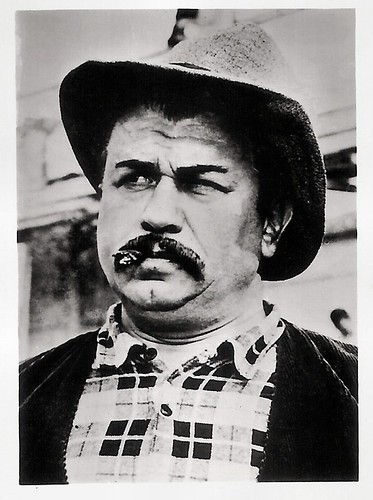
Small West-German collectors card by Greiling Sammelbilder, Serie E, no. 103. Allianz-Film. Publicity still for Don Camillo (Julien Duvivier, 1952).
A goodhearted but sometimes explosive communist mayor
After World War II, Gino Cervi continued to give credence to Italian costume dramas and historical epics in the cinema. On stage, he and the Eliseo company mounted Italian premieres of new foreign theatre works; his George in Jean Cocteau’s 'Les Parents terribles' (Intimate Relations, 1945) and Hector in Jean Giraudoux’s 'Tiger at the Gates' (1946) further enhanced his reputation. His outstanding theatrical accomplishment, however, was his portrayal of the title role in 'Cyrano de Bergerac' (1953), an interpretation that was enthusiastically received, even in Paris.
In the 1950s Gino Cervi became a worldwide known film star as the goodhearted but sometimes explosive Communist mayor Giuseppe Bottazzi better known as Peppone, the antagonist of Fernandel’s hot-heated catholic priest Don Camillo. Cervi and French comedian Fernandel co-starred in five films over a period of some 15 years, starting with Don Camillo/The Little World of Don Camillo (Julien Duvivier, 1952) and ending with Il compagno Don Camillo/Don Camillo in Moscow (Luigi Comencini, 1965). The films were based on the stories by Giovanni Guareschi, published from 1948 on – the first novel was 'The Little World of Don Camillo'.
In the late 1950s and early 1960s, Cervi played in several other comedies of the Commedia all’Italiana genre, such as Guardia, guardia scelta, brigadiere e maresciallo/Watch, Select Watch, Sergeant and Marshal (Mauro Bolognini, 1956) starring Alberto Sordi, Gli Anni ruggenti/Roaring Years ( Luigi Zampa, 1962) with Nino Manfredi, and Gli onorevoli/The Honorables (Sergio Corbucci, 1963) starring Totò, but he also played a memorable fascist leader in Florestano Vancini’s war film La lunga notte del ’43/It Happened in '43 (Florestano Vancini, 1960) starring Belinda Lee.
From the mid-1960s on, Cervi focused more on television. From 1964 to 1972, Cervi incarnated Georges Siménon’s Commissaire Jules Maigret in the RAI TV series Le inchieste del commissario Maigret. In this TV series, Andreina Pagnani always played his wife. The series eventually caused him to play in a Maigret film for the big screen: Maigret a Pigalle (Mario Landi, 1966), produced by his own son, Tonino Cervi. The series was often repeated at RAI and had an intense second life through video and DVD as well. Siménon considered Cervi’s interpretation as one of the best.
In 1972 Cervi quit acting. His last performances were for brandy commercials. Gino Cervi died in Punta Ala, Italy in 1974. Actress Valentina Cervi and producer Antonio Levesi Cervi are his grandchildren.
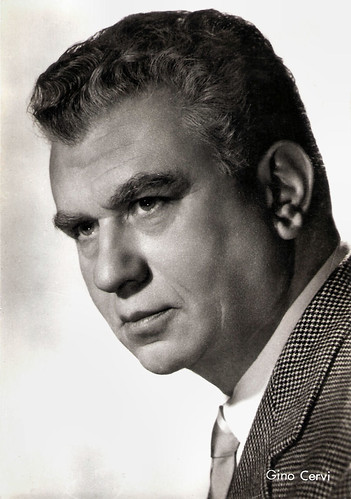
Italian postcard by Bromostampa, Milano, no. 291. Photo: Sam Lévin.
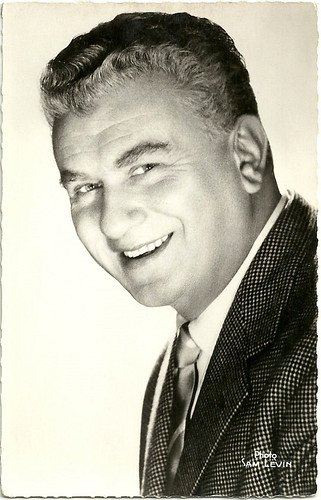
French postcard. Photo: Sam Lévin.
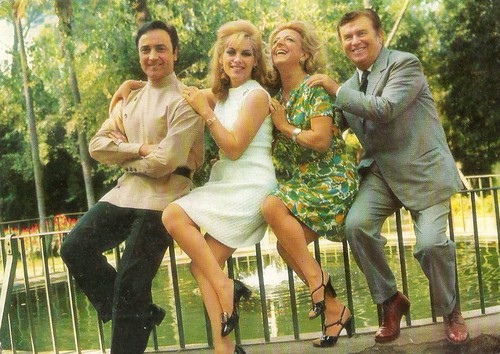
Italian postcard. Gino Cervi, Laura Adani, Paolo Carlini, and Graziella Granata in the Alan Ayckbourn stage comedy 'Relatively Speaking', retitled 'Sinceramente Bugiardi' (Sincerely Liars, 1970), directed by Mario Ferrero, and played by the Compagnia di Prosa, led by Cervi.
Scene from Le retour de Don Camillo/The Return of Don Camillo (1953). Source: Kochlorber (YouTube).
Leader of Maigret a Pigalle (1966). Source: ShaolinTube (YouTube).
Sources: Elaine Mancini (Film Reference), Hal Erickson (AllMovie), Piergiorgio Romani (IMDb), Encyclopaedia Britannica, Wikipedia (French, Italian and English), and IMDb.
This post was last updated on 15 September 2023.
No comments:
Post a Comment